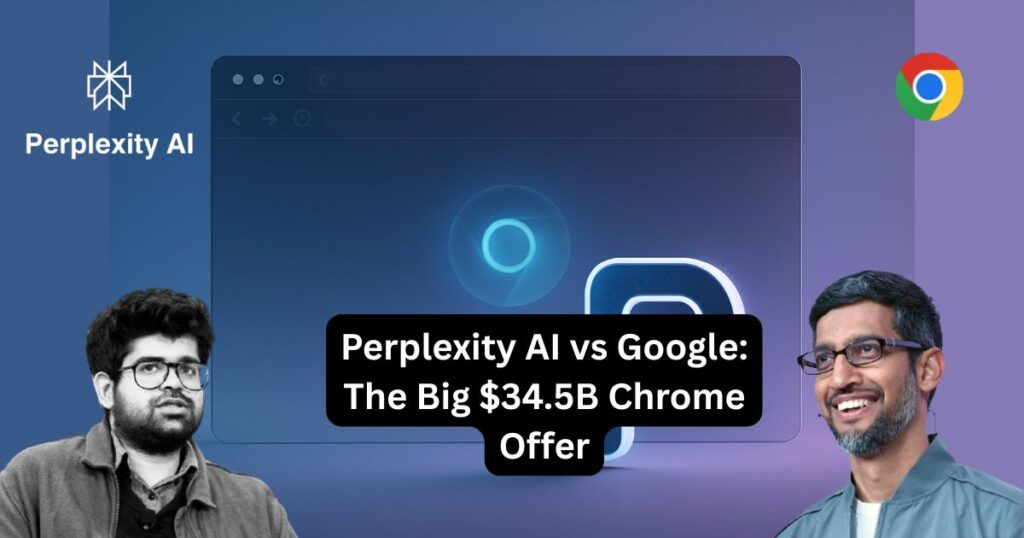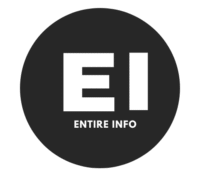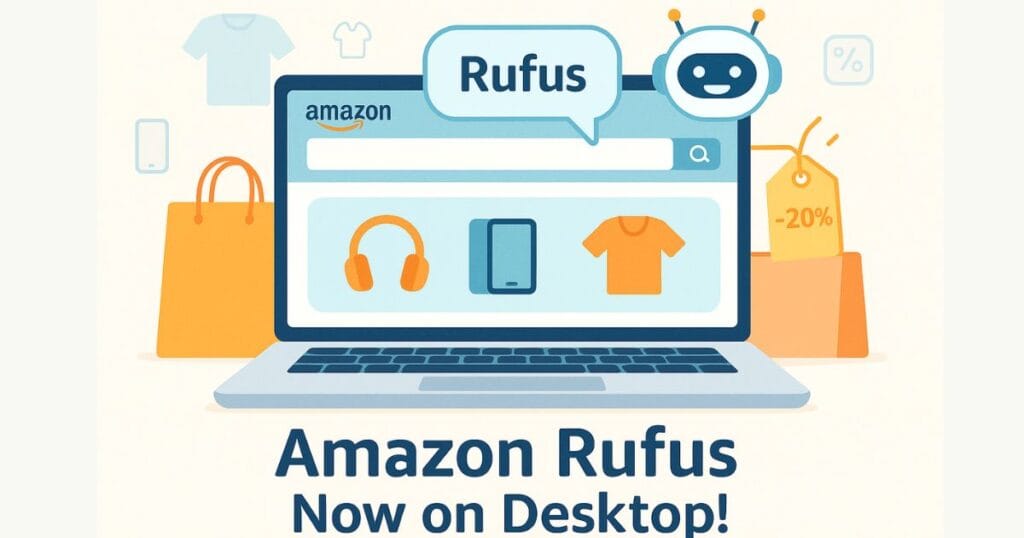Perplexity AI, a rising tech company, has made a huge $34.5 billion all-cash offer to buy Google’s Chrome browser. This surprising news broke on August 12, 2025. The offer was sent to Google without them asking for it, meaning Google hasn’t said they want to sell Chrome. Perplexity says they’re ready to take over Chrome and make it even better if Google is forced to sell it. This offer comes at a time when Google is facing a big lawsuit in the U.S., which claims they unfairly control the online search market. Perplexity is trying to use this situation to their advantage.

Who is Perplexity and What Do They Do?
Perplexity AI is a new company that started in 2022 and is based in San Francisco, USA. It was founded by Aravind Srinivas, an Indian from Chennai. The company builds a special kind of search engine that uses artificial intelligence (AI) to give direct, accurate answers to questions, along with links to where the information came from. Unlike Google, which shows a list of websites, Perplexity focuses on being an “answer engine.” They recently launched their own browser called Comet, which uses AI to help with tasks and searches. Perplexity has received $1 billion from big investors like Jeff Bezos (Amazon’s founder), Nvidia, and SoftBank, and the company is valued at $14-18 billion.
How Much is the Offer and How Was It Made?
Perplexity offered $34.5 billion in cash to buy Chrome, with no shares or ownership stakes involved. They sent this offer to Alphabet, Google’s parent company, in a formal letter on August 12, 2025. Perplexity says they’ve got promises from big investors to cover the full amount, though they haven’t named these investors. The offer comes with some promises:
- The code behind Chrome (called Chromium) will stay free and open for others to use.
- Perplexity will spend $3 billion over two years to improve Chrome.
- Google will remain the default search engine in Chrome, but users can switch to another one if they want.
Why Now? The Background of the Offer
This offer comes at a key moment because Google is in the middle of a big lawsuit in the U.S. In 2024, a judge ruled that Google illegally controls 90% of the online search market. The U.S. government’s Department of Justice (DOJ) is now pushing for punishments, which might include forcing Google to sell Chrome to create more competition. A decision could come soon, possibly in August 2025. Perplexity spoke in this lawsuit earlier, saying they’d be interested in buying Chrome. So, they made this offer to jump on the opportunity. Earlier this year, Perplexity also tried to buy TikTok’s U.S. business, showing they’re aiming for big deals.
Why is Chrome So Special?
Chrome is the world’s most popular web browser, used by over 3 billion people and holding about 65% of the global market. It’s a big deal for Google because:
- It’s the main way people access Google’s search engine.
- It collects user data (like what you search for), which helps Google improve its ads and AI.
- Chrome’s code, Chromium, is free and used by other browsers like Microsoft Edge and Opera. With AI becoming more important, browsers are now key for delivering smart, personalized search experiences, making Chrome a valuable asset.
Can Perplexity Pull Off This Huge Deal?
Perplexity is valued at $14-18 billion, so offering $34.5 billion is a stretch. They say they have investor support to cover it, but many experts think the deal is unlikely because:
- Chrome is worth more than $50 billion, so the offer might be too low.
- Google doesn’t want to sell Chrome, as it’s critical to their business.
- If a court forces a sale, other companies like OpenAI or Yahoo might offer more money. Perplexity has tried buying smaller browsers before without success, but this offer shows they’re serious about competing with big players like Google.
What Might Google Think About This?
Google hasn’t officially responded to the offer. However, they’ve said before that they don’t want to sell Chrome and will fight the lawsuit in court. They argue that selling Chrome would hurt users and make the internet less safe. Google plans to appeal the lawsuit decision, which could drag on for years, possibly reaching the Supreme Court. They see Chrome as a key part of their AI plans and revenue, so they’re unlikely to agree unless forced by a court.
Legal and Government Hurdles in the Deal
This deal faces several challenges:
- The ongoing lawsuit could force Google to sell Chrome, but Google’s appeals might delay this for years.
- If the deal happens, the government will check if it helps create more competition in the search market. Perplexity must prove they’ll run Chrome better than Google.
- There could be concerns about data privacy and how Perplexity uses AI in Chrome.
- Since Chrome is used worldwide, other countries’ governments might also review the deal.
How Will This Affect Users and Developers?
If the deal goes through:
- Users: Perplexity promises no major changes to Chrome. Google will stay the default search engine, and users can choose others. They’ll invest $3 billion to add new features, possibly using AI, but some might worry about how their data is handled.
- Developers: Chromium will remain free and open, allowing developers to create new tools and browsers. This could lead to more innovation.
Impact on Ads and the Search Market
If Chrome is no longer owned by Google, it could weaken Google’s control over ads and search. Chrome drives a lot of traffic to Google’s search engine, which powers their ad business. If Perplexity owns Chrome:
- They might introduce new AI-based ads.
- Competitors like OpenAI could gain ground in the search market.
- Since Google stays the default search engine, ads might not change much at first. Over time, AI-driven search could change how ads work, moving away from traditional models.
How the Market and Investors Reacted
When the news broke, Alphabet’s stock price went up by 1-2%, showing some excitement but also doubt. Many investors think this offer is more of a publicity move to get attention for Perplexity. They believe $34.5 billion is less than Chrome’s true value of over $50 billion. However, the offer has sparked interest in the tech industry, highlighting the growing role of AI and browsers. Some see it as a sign of future competition, but most don’t think the deal will happen soon.
Is This a Stunt or a Real Plan to Buy?
Some experts call this a “stunt” to make Perplexity more famous, especially since the offer is lower than Chrome’s worth, and Google is unlikely to sell. However, Perplexity has detailed plans and investor backing, suggesting they’re serious, especially if a court forces a sale. This move fits their goal of challenging Google in search and browsers.
Big Risks and Challenges in the Deal
The deal has several risks:
- Investors might back out, leaving Perplexity short on funds.
- Google’s appeals could delay the sale for years.
- Other companies like OpenAI might offer more money.
- There could be legal issues around data privacy or AI use.
- Managing Chrome’s 3 billion users and keeping Google’s team on board will be tough.
Check Perplexity AI
What Happens Next? A Timeline
- August-September 2025: The court might order Google to sell Chrome.
- 2025-2026: Google will appeal, possibly delaying things for 1-3 years.
- After 2026: If the court order stands, Chrome could be auctioned off. Perplexity will bid, but others might too. If Google wins the appeal, the deal won’t happen.
ALSO READ- Perplexity’s new AI browser ‘Comet’: Know how it will change your internet usage habits
Conclusion
If this deal happens, it could shake up the internet and tech industry. Google’s grip on search and browsers would weaken, giving smaller companies a chance to compete. Users might get more choices and AI-powered features. The tech industry would see more startups challenging big players like Google. Even if the deal fails, it shows how important browsers and AI will be in the future.
Is the offer real?
Yes, confirmed by reliable sources, but it’s unsolicited.
Can Perplexity afford it?
They have investor support, but it’s a huge amount for them.
How will users be affected?
No big changes at first, but AI features might come later.


